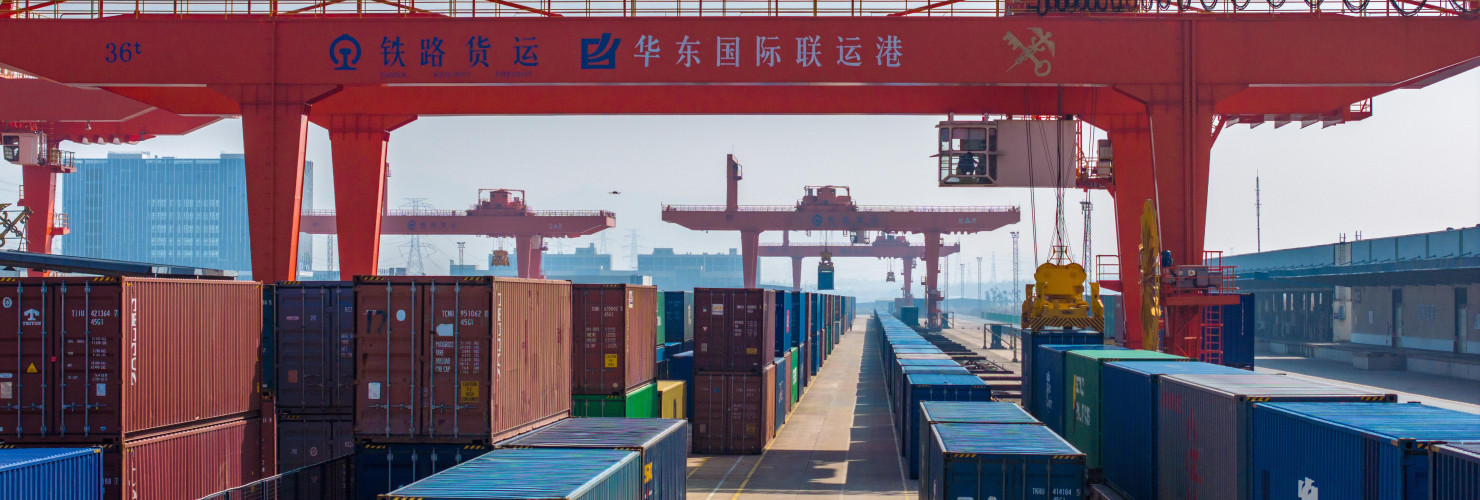

Germany: Assessing the risks of de-risking
You are reading the Germany chapter from the ETNC Report 2024 "National Perspectives on Europe’s de-risking from China". Go back to the main page.
Risk awareness has moved to the centre of Germany’s China debate. The country’s first National Strategy on China, published in July 2023, endorses the European Union’s call for de-risking, even though the definitions in Berlin and Brussels are not entirely in sync. German political and business circles are relieved that the new framing has replaced the decoupling narrative. Nonetheless, Germany remains reluctant to take the lead on a proactive de-risking agenda. Fears of losing the Chinese markets still dominate everyday politics as German industry struggles to adjust to the reality that the golden era of profiting from China’s development is coming to an end.
When President of the European Commission Ursula von der Leyen called for “de-risking” in relations with China in March 2023, endorsement of the terminology came natural to Berlin. German diplomats were quick to point out that it was actually Chancellor Olaf Scholz who had originally coined the term, citing an interview he had given five months before in which he had called for “de-risking and diversification”. At the time, critics accused Scholz of only using the term to put an end to an unwanted debate about decoupling from China. Von der Leyen, on the other hand, early on linked her de-risking concept to the objective of developing a risk assessment framework, including the compilation of a list of technologies that are critical to economic security.
Terminological ownership discussions aside, the new de-risking framing fitted well with German efforts to finalise its first National Strategy on China, which was eventually published in July 2023 after months of difficult negotiations. Since then, the focus on risks has become the new vantage point for Germany’s China debate. Nonetheless, despite a broad consensus that risks need to be analysed more and addressed better, there are vastly different views when it comes to the practicalities.
German industry is pushing back against efforts to further regulate business relations with China. Thus far, Germany has not delivered the guidance on how to implement de-risking that many European partners would expect from the EU’s largest economy. The incoherent positioning of the German coalition partners on the EU’s supply chain law is a case in point: Resistance from the Free Democrats (FDP) meant that Germany had to abstain during voting on the law, which requires larger EU firms to carry out detailed human rights and environmental audits on foreign business partners, not only but also in China.
The de-risking compass of Germany’s National Strategy on China
Germany’s first National Strategy on China was the result of an 18-month long process involving stakeholders from many sectors, but in particular the powerful industrial lobby. The strategy managed to establish a fairly solid consensus on Germany’s current political thinking on China and received fundamental approval from essentially all relevant voices. It delivered a strong and (as far as diplomatic language goes) outspoken analysis of China’s trajectory under Xi Jinping but remained vague on new or concrete measures to address the challenges identified.
Even if the term itself only appears five times, de-risking covers a large part of the 64-page document. “The federal government is working towards a de-risking of our economic relationship with China” and sees “de-risking as a smart addition to our core strengths: the openness of our political, economic and social system”. More specifically, the government advocates de-risking by “reducing dependencies in critical areas, viewing business decisions also from a geopolitical perspective and increasing our resilience”.
The strategy acknowledges that the government is concerned about the high level of exposure of key industry sectors to the Chinese market – particularly car making but also, for example, machinery and chemistry – but is wary of intervening. The government “expects that companies will concretely examine their China-related developments, numbers and risks within the framework of existing risk management processes”. It offers confidential exchanges with companies that are particularly exposed and calls for international diversification of business activities.
The strategy warns managers not to bet on government bailouts, stating that “in case of a geopolitical crisis, public funds will not be used to save [companies]”. The existing toolbox of defensive instruments is to be put to better use and further regulation to protect the German and European economy will be discussed, including outbound investment screening.
The political reality of de-risking: Struggling to walk the talk
While the government’s strategy seems to provide a clear compass, the political reality of de-risking is more ambiguous. Two prominent cases demonstrate this well: the inclusion of Chinese technology in German 5G networks and investment by China’s state-owned shipping giant, COSCO, in Hamburg’s port.
In 2023, just as de-risking became the new mantra, Chancellor Olaf Scholz allowed COSCO to acquire a 24.99 percent stake in one of Hamburg port’s container terminal operators, HHLA. The decision was highly controversial because all the German ministries involved had openly positioned themselves against the investment, citing concerns about Chinese influence over critical infrastructure. Scholz overruled his ministers in what was largely seen as bowing to pressure from both Hamburg (where Scholz had previously served as mayor) and Beijing. Chinese diplomats had delivered thinly veiled threats of retaliation against German companies in China and rerouting of Chinese trade to other European ports.
Advocates of the deal argue that COSCO’s involvement is legally structured in a way that prevents China from gaining strategic influence or insights, and highlight the competition with other European ports, many of which also have Chinese investors. Nonetheless, the Hamburg port has become a symbol of German unwillingness to walk the talk on de-risking when it serves national or individual political interests.
The case of Chinese technology in German 5G networks follows a similar pattern. According to expert estimates, Germany is one of the EU member states with the highest share of Huawei and ZTE components in its 5G networks. This was made possible by regulations passed under the Merkel administration, in the face of substantial resistance in the German parliament and even within her own party, that pushes responsibility for using “safe” technology on to network operators, without making any specific demands of Chinese equipment.
The current government seems to be shifting to more restrictive regulation. The Ministry of the Interior has demanded that Chinese technology be removed from the core network and significant reductions in the radio access network (RAN), a major component of wireless telecommunications systems that connects individual devices to other parts of a network. The infrastructure ministry, however, is resisting these tougher measures, largely to protect network operators that are complaining about the cost of switching to non-Chinese equipment. As of early 2024, the government has not yet provide any guidance, once again creating the perception that Germany is reluctant to take concrete steps on de-risking.
Nonetheless, even if these high-profile cases indicate how hard it is for the German government to take bold steps on de-risking when the financial and political stakes are high, there is a clear trend for politicians and institutions to be more willing to publicly highlight China-related risks. In some recent examples:
- A 2023 report by the German Domestic Intelligence Services (Verfassungsschutz) assessed China as “the biggest threat in terms of industry and science espionage as well as foreign direct investment to Germany”. It particularly warns of China’s strategy of civil-military fusion and calls for greater awareness of China’s ability to collect important information in ways that are “legal and legitimate”, such as joint ventures or scientific cooperation.
- The Ministry of Economic Affairs and Climate sent a survey to German companies asking them to assess their vulnerabilities to supply chain disruptions and other China-related risks. The results are yet to be published but media reports suggest that the willingness of companies to share such information was underwhelming. The ministry’s scientific advisory board has called for the establishment of a “European office for supply security” to be tasked with monitoring China-related supply chain risks.
- Germany’s Minister of Education and Science has repeatedly called on German universities to critically reassess their cooperation with Chinese universities and Confucius Institutes. Similarly, the German Rectors Conference, an association of German universities and other higher education institutions, publicly criticised efforts by Confucius Institutes to seek political influence by spreading and defending the narratives of the Chinese Communist Party in their courses or during their public events.
- Concern about China-related risks has also reached the sub-national level. State ministries report that many cooperation projects have been put on hold and a perceived increased reluctance among municipalities and other regional actors to receive Chinese delegations. More critical questions are being asked about Chinese intentions.
German industry
Business interests remain a defining force in German China policy. For German industry, the “de-risking, not decoupling” terminology came as a relief. For a number of years, many German businesses have felt under pressure to publicly justify why they remain active in China. Even though there were never any serious calls or demands for a decoupling of German business from China, the idea was a focal point of public debate that put companies under pressure time and again. The turn towards de-risking has paved the way to a more nuanced discussion of risks – or even an avoidance of risk.
The flexibility of the term allows for basically any strategy to be labelled de-risking. This includes investments in China, arguing that such “in China for China” strategies would help to contain China-related risks within the Chinese market and avoid disruption of global supply chains and vulnerabilities in other markets. (This argument is most prominently made in the case of a €10 billion chemical plant the multinational chemical producer BASF is currently constructing in Guangdong.)
In January 2024, a survey by the German Chamber of Commerce in China revealed that only 44 percent of German companies on the ground claim to be taking steps to de-risk their business, and most of them for geopolitical reasons. Another 45 percent stated that they were not taking any steps into that direction and 54 percent said they intended to make further investments in China. These numbers may, however, downplay the de-risking trend. Country managers operating in China are often committed to the China business of their company and careful not to send any signals that could lead to a political backlash. German headquarters, by contrast, often take a more global view of their businesses and tend to have a different risk perception. In recent years, there has been anecdotal evidence to suggest that companies are becoming wary of the extent to which they can trust their China business units to give them a full picture of the risks.
Conclusions and outlook
Recent debates have hardwired a mainstream political position that puts risk at the centre of all approaches to China. This view is shared across the major political parties as well as large parts of the business community. Germany is also aware that it plays a pivotal role in Europe’s de-risking efforts. Thus far, however, this recognition has not translated into a visible leadership role. In Berlin, relations with China are seen as too complex and multi-layered to allow a swift political change of course. The German government is committed to keeping the bilateral relationship stable in order to protect German business interests and avoid supply chain disruptions. Even if there seems to be consensus that the old mantra of “whatever benefits a German company in China also benefits the German economy” no longer holds true, de-risking efforts are approached carefully in the assumption that too much de-risking is a risk in itself.
At a time when the German government feels challenged by a multitude of internal pressures from economic recession to the rise of far-right populists, as well as the external crises in Ukraine and the Middle East, and uncertainty about next US elections, China policy and the de-risking agenda are in danger of slipping off the list of priorities. Short-term trouble shooting pays more of a political premium than long-term strategic re-shifting. For politicians, it is tempting to stick to “cheap talk” for the time being and avoid costly action. Nonetheless, recent years and current developments have created a growing awareness that the cost of inaction is rising.
You were reading the Germany chapter from the ETNC Report 2024 "National Perspectives on Europe’s de-risking from China". Go back to the main page.

